Today 2 Nov is Odin's Festival
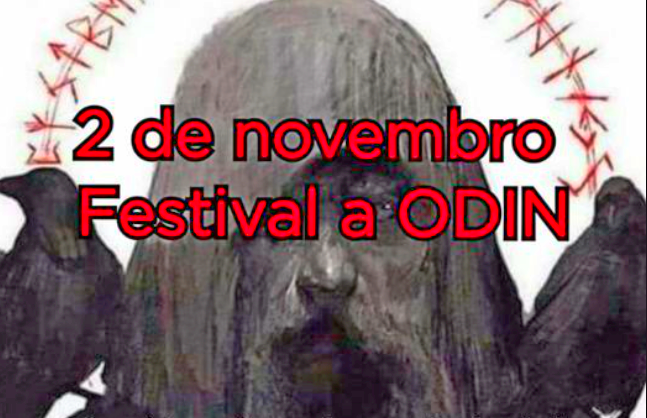
Witch's Balcony - 02 Nov 2020
On this day, the mysteries of life, death and rebirth were performed with mimes, songs and offerings for the souls of the dead.
Odin or Ódin (in Old Norse: Óðinn) is considered the main god of present Nordic culture and also known as "Father of All" and "Warlord's envoy".
Their role, like that of many Nordic gods, is complex; he is the god of wisdom, war and death, although also, to a lesser extent, magic, poetry, prophecy, victory and hunting.
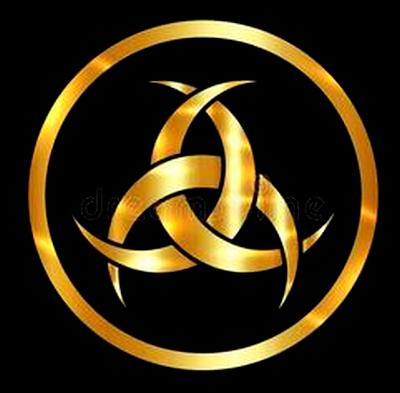
Odin lived in Asgard, in the palace of Valaskjálf, which he built for himself, and where his throne, Hliðskjálf, is located, where he could observe what happened in each of the nine worlds. During combat he brandished his spear, called Gungnir, and mounted his eight-legged steed, called Sleipnir. He was the son of Borr and jotun ("giant") Bestla, brother of Vili and Vé, [2] Frigg's husband and father of many of the gods. such as Thor, Baldr, Vidar and Váli. In scaldic poetry reference is made to him with diverse kenningar, and one of those that is used to mention it is Allföðr ("father of all").
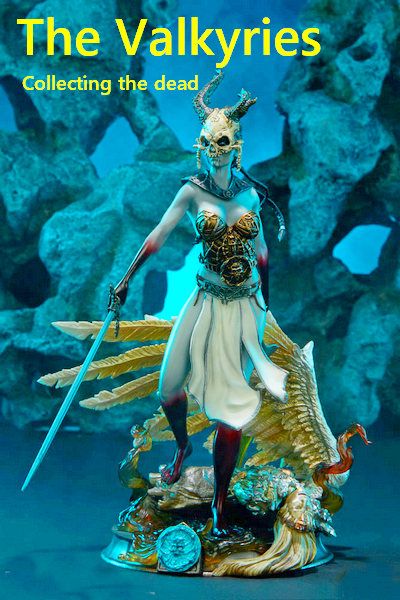
As a god of war, he was in charge of sending his daughters, the Valkyries, to collect the bodies of the heroes killed in battle, the einherjar, who sit beside him in the Valhalla from which he chairs the banquets. At the end of time Odin will lead the gods and men against the forces of chaos in the battle at the end of the world, Ragnarök. In this battle the god will be killed and devoured by the ferocious wolf Fenrir, who will be immediately killed by Vidar, who, with one foot on his throat, will pull out his jaw
Etymology
The gods' names are found in archaic Nordic (or Old Norse) Óðinn (Saxo Grammaticus, Latinizing writes Othinus), in the Germanic Wotan and in the Germanic primitive in the form of Wodanaz, in the Gothic, Vôdans, in the Faroese dialect (on the coasts from Norway), Ouvin, in the ancient Saxon, Wuodan, in the high German, Wuotan, while among the Lombards and in the region of Westphalia Guodan or Gudan appears, and in Friesland, Wêda. In the dialects of Alamans and Borgunds we have the expression Vut, still used today in the sense of idol. These denominations are linked at the root, in the Old Norse, to the words vada and od, and, in Old High German, to Watan, Navutan, Wuot, which at first meant reason, memory or wisdom. Later they became equivalent to stormy or violent, a sense that the Christians made an effort to accentuate, trying to disparage the figure of the Norse god.
Day of the week of dedication
Wednesday, the day dedicated to the god, took the denominations, in English, wednesday (old Saxon, wôdanes dag, Anglo-Saxon, vodnes dag), in Dutch, woensdag (Middle Dutch, woensdach), in Swedish and Danish, onsdag (Old Norse, odinsdagr), and in the Westphalian dialect, godenstag or gunstag ..
Quotes in Edda Poética
In Edda Poética, the biggest cycle is naturally that of the supreme god, comprising the following ballads: Baldrs Draumar (Baldr's Dreams), Hárbarzljóð (Harbard's Ballad), Vafþrúðnismál (Vafthrudnir's Ballad), Grímnismál (Grimnir's Ballad) ) and Hávamál (The Maxims of Hár).

Odin performs under different names in the ballads, according to the demands of the situation. We know from Völuspá (The Seer's Prophecy) and Hyndluljóð (The Ballad of Hyndla) that he is Borr's son. The elevated designations of an old creator and father of men, which the anonymous poet gave him in Baldrs Draumar and Vafþrúðnismál, as well as the information that Odin had given the breath (Völuspá) to an inanimate couple, leaves no doubt about an interference in creation of humanity. In Grímnismál there is the nickname of prince of men, in Lokassena (The Alteration of Loki) father of battles, in Völuspá, father of armies, and in Grípisspá (The Prophecy of Gripir), father of choice or father of the dead in battle.
Personality
In current language in Scandinavian countries and northern Germany, as observed among educated people, the expressions zu Odin fahren or hei Odin zu Gast sein are used, and far þu til Odin or Odins eigo sãoik, also cited by Jacob Grimm, for imprecations equivalent to go to the devil, or the devil who carries it. It is a malevolent tendency that can be explained, not only by the action of Christianity, but also by the violent and dark attitudes that the god took, inflicting inflexible punishments, such as the sleep imposed on (Valkyrie) Brynhild for having disobeyed him, and crossing the airs with its army of evil spirits, on stormy nights, on the so-called Wild Huntings. About Eddas, it is known that they were written in the early dark ages, but it is known that the traditions that originated it and were transmitted orally, date from more than three thousand years B.C.
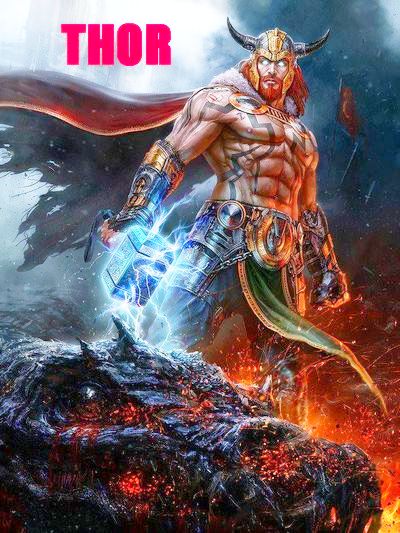
Virtues
The name "father of magic", in Baldrs Draumar, confirmed in his own testimony from Hávamál (part IV), describes his own sacrifice: he was wounded with the spear and suspended in a tree, where he remained agitated for nine days by the winds; this tree is Yggdrasill, the ash tree of the world. All this aiming at the initiation in the wisdom of the runes, having even created some of them, becoming lord of the mead of poetry, magic liquor that pronounces predictions.
As for Odin's high knowledge, it is reported that he was not always so, wise and powerful magician; eager to know all things, he wanted to drink from the fountain of Wisdom, where the ash tree Yggdrasill dives one of the roots; but Mímir, his uncle, the guardian of the fountain, wise and prudent, only granted him the favor on the condition that Óðinn give him one of his eyes. He then found in the water of the miraculous source as much wisdom and secret powers that he could, as soon as Mímir was killed in the war between the Æsir and the Vanir, give him the faculty of being reborn by wisdom: his head, embalmed thanks to the care of the gods, is able to answer all the questions that are addressed to you. After acquiring so much knowledge, he then tried to reveal it in duels of words, in which he bets his life and always wins. Furthermore, he often addresses prophetesses and visionaries, asking for strange information, paying them rich gifts.
Cultivation
In this way, we see that Óðinn, in the conception of the ethical poet, is the creator of humanity, the supreme holder of knowledge, magic formulas and runes, invoked during battles, during shipwrecks and diseases, in defense against the enemy, and after all in any desperate situation. Altars rose in his honor.
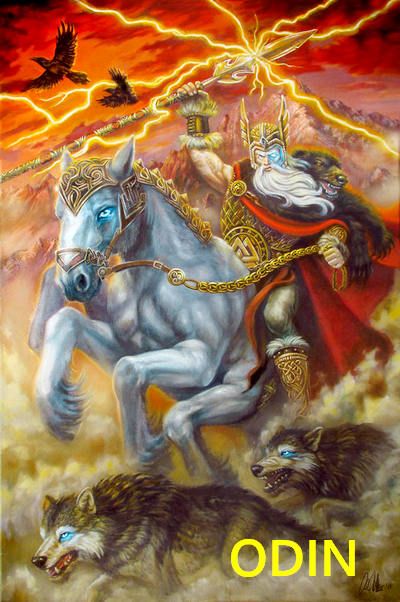
Symbols.
In Edda's ballads, the supreme god is connected with symbols, emblems and certain elements appropriate to the different circumstances in which he appears. Thus, in Valhöll (Valhalla), it has its grand palace where it receives and houses the most valiant warriors, and in another of its three halls in Ásgarðr (Asgard), the high Valaskjalf, sits on the Hlidskialf throne, from where it is possible see the whole world and follow all the events of life. At his feet, the two wolves Geri and Freki lie, symbols of greediness, who accompany him in his hunts and fights, feeding on the corpses of the warriors. On his shoulders are the two crows Munin and Hugin, whispering to him what they saw and heard from all corners. When he goes to battle, which is often, he wears armor and a gold helmet, carrying in his hands the shield and the spear Gungnir, with runes engraved on the hilt, riding his famous eight-legged steed, Sleipnir, who has the faculty to ride in space, over land and water.
Costumes
In many passages, Odin's wanderings are described, in which he appears in the guise of a short, dark-haired traveler, wrapped in a huge blue or gray cloak, with a wide-brimmed hat, broken above the lost eye and the another sparkling black eye, as in the Vadþrúðnismál and Grímnismál ballads, and with the significant names of Gagnrad (which determines victory), Grimnir (the undercover), in addition to Hávalmál (part III) and in the Baldrs Draumar, respectively with the names Hár (the high, the eminent, the sublime) and Vegtam (the one accustomed to the paths).
COPYRIGHTS
Copy & Paste lenken øverst for Yandex oversettelse til Norsk.
WHO and WHAT is behind it all ? : >
VISIT THE PAPERTURN 20 OCT ARCHIVE
The bottom line is for the people to regain their original, moral principles, which have intentionally been watered out over the past generations by our press, TV, and other media owned by the Illuminati/Bilderberger Group, corrupting our morals by making misbehaviour acceptable to our society. Only in this way shall we conquer this oncoming wave of evil.
Commentary:
Administrator
HUMAN SYNTHESIS
All articles contained in Human-Synthesis are freely available and collected from the Internet. The interpretation of the contents is left to the readers and do not necessarily represent the views of the Administrator. Disclaimer: The contents of this article are of sole responsibility of the author(s). Human-Synthesis will not be responsible for any inaccurate or incorrect statement in this article. Human-Synthesis grants permission to cross-post original Human-Synthesis articles on community internet sites as long as the text & title are not modified.
The source and the author's copyright must be displayed. For publication of Human-Synthesis articles in print or other forms including commercial internet sites. Human-Synthesis contains copyrighted material the use of which has not always been specifically authorized by the copyright owner. We are making such material available to our readers under the provisions of "fair use" in an effort to advance a better understanding of political, economic and social issues. The material on this site is distributed without profit to those who have expressed a prior interest in receiving it for research and educational purposes. If you wish to use copyrighted material for purposes other than "fair use" you must request permission from the copyright owner.